Get Involved at McCourt
We encourage you to learn about some of the ways you can get involved after you enroll at McCourt. From student organizations to GU Politics or working with the local DC community, engagement outside of the classroom is a valuable add-on to your McCourt curriculum.
Student Organizations
A big part of student life at McCourt is getting involved with one of our student organizations. With 20 to choose from, our student organizations cover a variety of policy interests, geographic regions, and identity groups. As a student you can get involved with as many as you would like in whatever capacity works for you; you can join the board of an organization or simply just attend some events. To explore our student organizations and ways you can get involved, check out our Student Organization homepage.
Some of our current student organizations have created a short video to detail their group and the work they do on and off campus. Learn more by watching each video below!
- Black Perspectives on Public Policy (BPoPP)
- East Asian Policy Association (EAPA)
- European Policy Organization (EPO)
- Georgetown Latino Policy Institute (GLPI)
- Georgetown Public Policy Review (GPPR)
- GradGov
- Latin American and Caribbean Policy Association (LAPA)
- McCourt Education Policy Initiative (MEPI)
- McCourt Election Org (MEO)
- McCourt Energy & Environment (E&E)
- McCourt Policy in Practice (MPiP)
- McCourt Student Association (MSA)
- South Asian Policy and Research Initiative (SAPRI)
- Women in Public Policy Initiative (WiPPI)
We wanted to highlight a few of our student organizations and engagement opportunities available for current students:
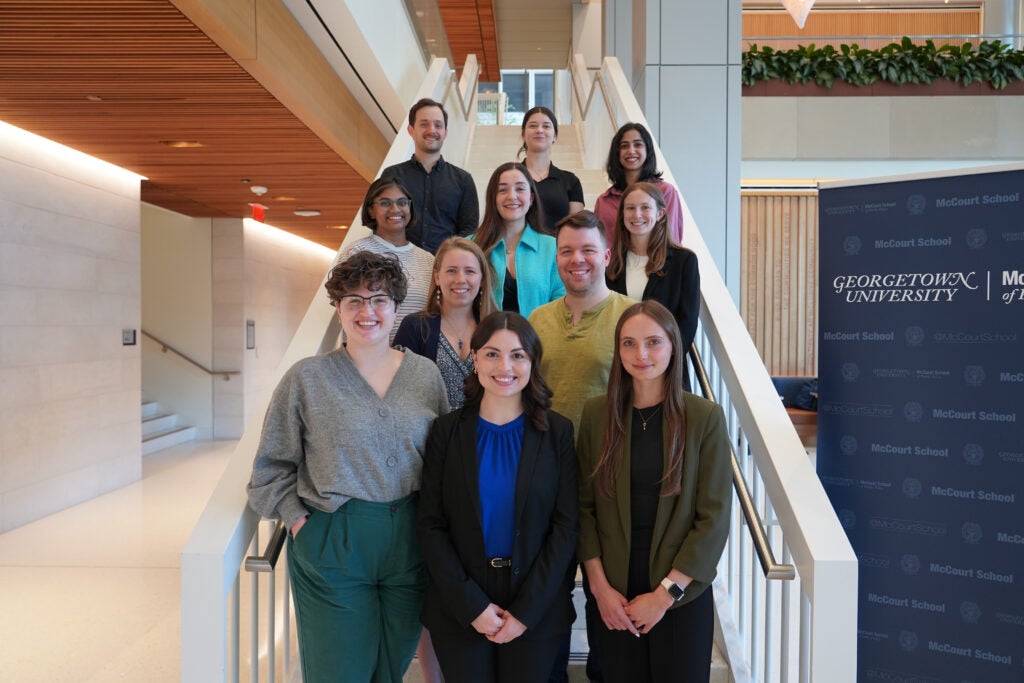
MSA Board, 2025
McCourt Student Association
The McCourt Student Association (MSA) is the student government at the McCourt School. MSA works to facilitate communication and collaboration among students, administrators, and faculty as well as to enhance the academic, social, and professional experiences of McCourt students. All enrolled members of the McCourt School are members of the MSA, and the MSA Board is made up of representatives from all degree programs at McCourt.
MSA oversees all student organizations, and promotes engagement by funding student-driven initiatives that extend learning beyond the classroom. MSA-sponsored programming ranges from skills workshops, volunteering opportunities, networking events, and the annual State of McCourt town hall. MSA also hosts their own social and diversity events to facilitate community building at McCourt. To ensure that student feedback is incorporated into every aspect of academic and student life, the MSA Board regularly collects feedback from McCourt students through surveys and open forums and meets with McCourt administrators to guarantee the best possible experience for all students.
To learn more about MSA, check out their work on social media:
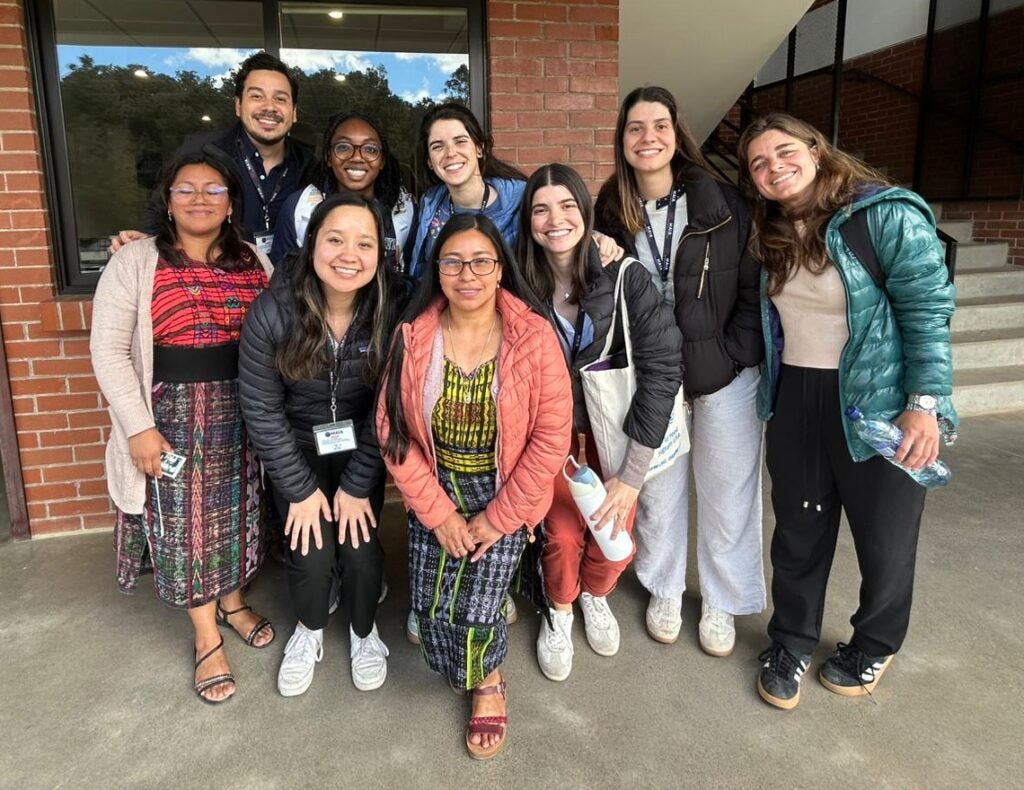
MPiP students in Guatemala, Spring 2025
McCourt Policy in Practice
At McCourt, we value service, student action, and social responsibility. McCourt Policy in Practice (MPiP) is a student-led organization at the McCourt School that allows students to put these values into practice by engaging in an ongoing policy-learning experience. By partnering with local communities and nonprofit organizations in Latin America, McCourt students are given the opportunity to use rigorous policy tools in designing, implementing, and evaluating sustainable, evidence-based development projects.
To learn more about MPiP, check out their work on social media:
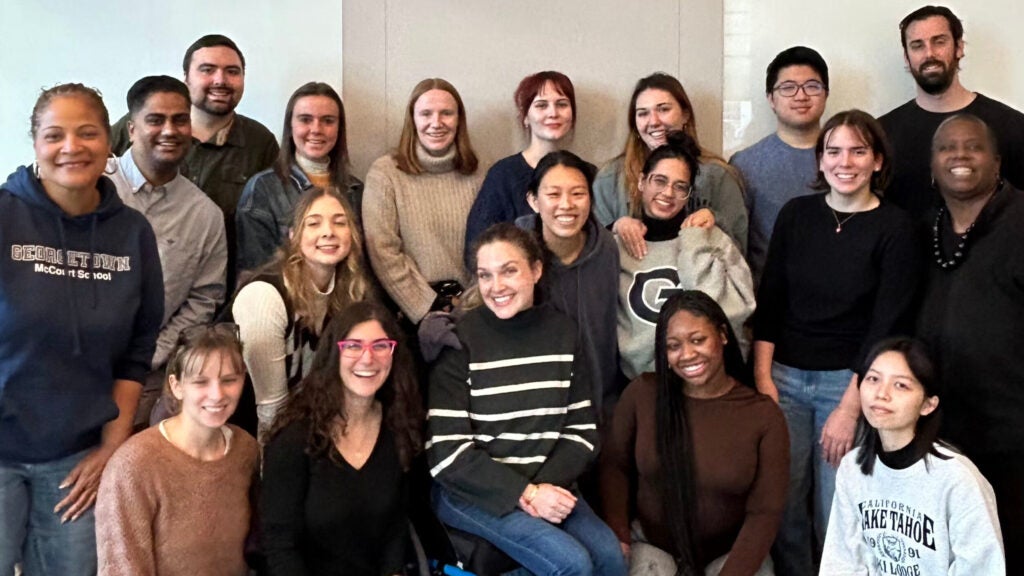
Policy Innovation Lab group photo, 2025
Policy Innovation Lab
“Putting people in policy” is our mantra.
The Policy Innovation Lab is a special initiative at the McCourt School, rooted in its commitment to Washington, DC. The Policy Innovation Lab provides McCourt students with a policy practicum grounded in Wards 7 & 8 of Washington, DC, which allows students to develop the skills to create policy that serves our local communities. Students engage in policy research, analysis, implementation, evaluation, power-sharing, and advocacy that advances the lab’s vision and mission.
The Lab’s work is grounded in three domains:
– Racial equity and social justice through its commitment to work on projects and policies that promote racial equity and advance an agenda of inclusion, equitable opportunity, and justice;
– Deep listening and engagement with community leaders, residents, and other stakeholders, recognizing that policy must be designed in collaboration with the people who it is designed to serve; and
– Systems and human-centered design thinking in order to deeply engage the experiences and views of residents, to help advance policy innovation, and to assist in understanding the complex and interdependent issues affecting the lives of residents and their communities in Wards 7 and 8.
The Lab has previously had teams dedicated to the following projects:
– Food Security Team
– Health Equity Team
– Diversion & Workforce Team
– Equitable Development Team
– Workforce Development Team
– Affordable Housing Team
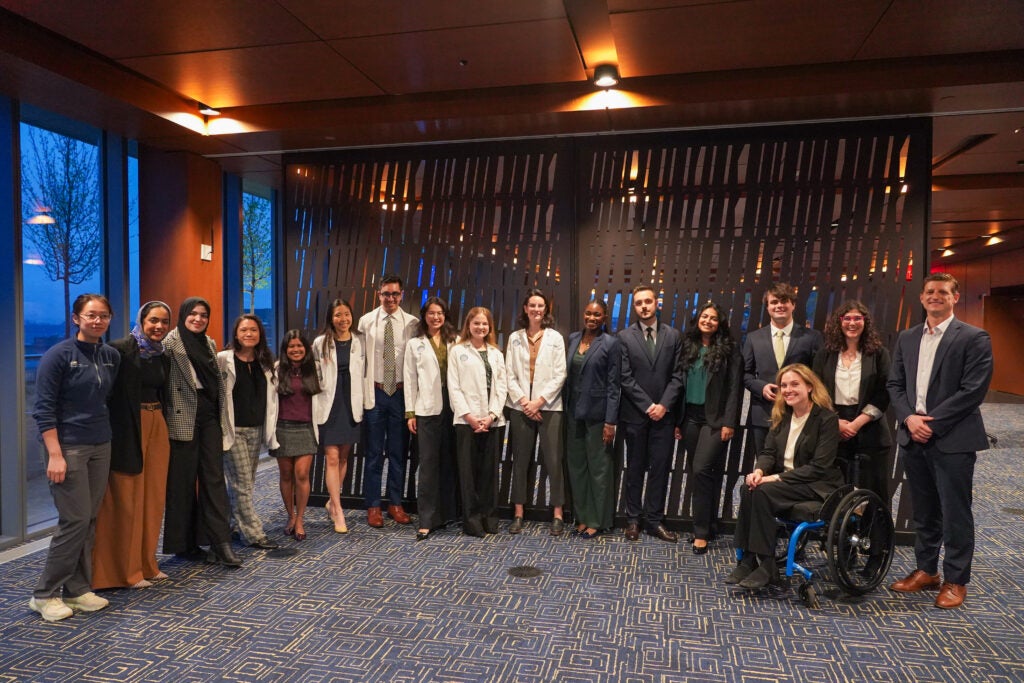
The 2025 Georgetown Public Policy Challenge finalists were selected from more than 50 team applications, proposing innovative policy solutions to some of DC’s most pressing challenges.
Policy Challenge
The Georgetown Public Policy Challenge tasks graduate students with developing innovative solutions to issues faced in Washington, DC. In teams, students work together to solve challenges facing the DC community. Since its founding in 2014, hundreds of students have participated in the challenges and thousands of dollars have been awarded, leading to the development and implementation of proposals focusing on a large range of policy issues across the District.
Winning proposals have focused on ending opioid-related deaths in the District, addressing issues young homeless parents face, supplying free flu vaccinations through a mobile clinic, and providing skills-based job training programs.
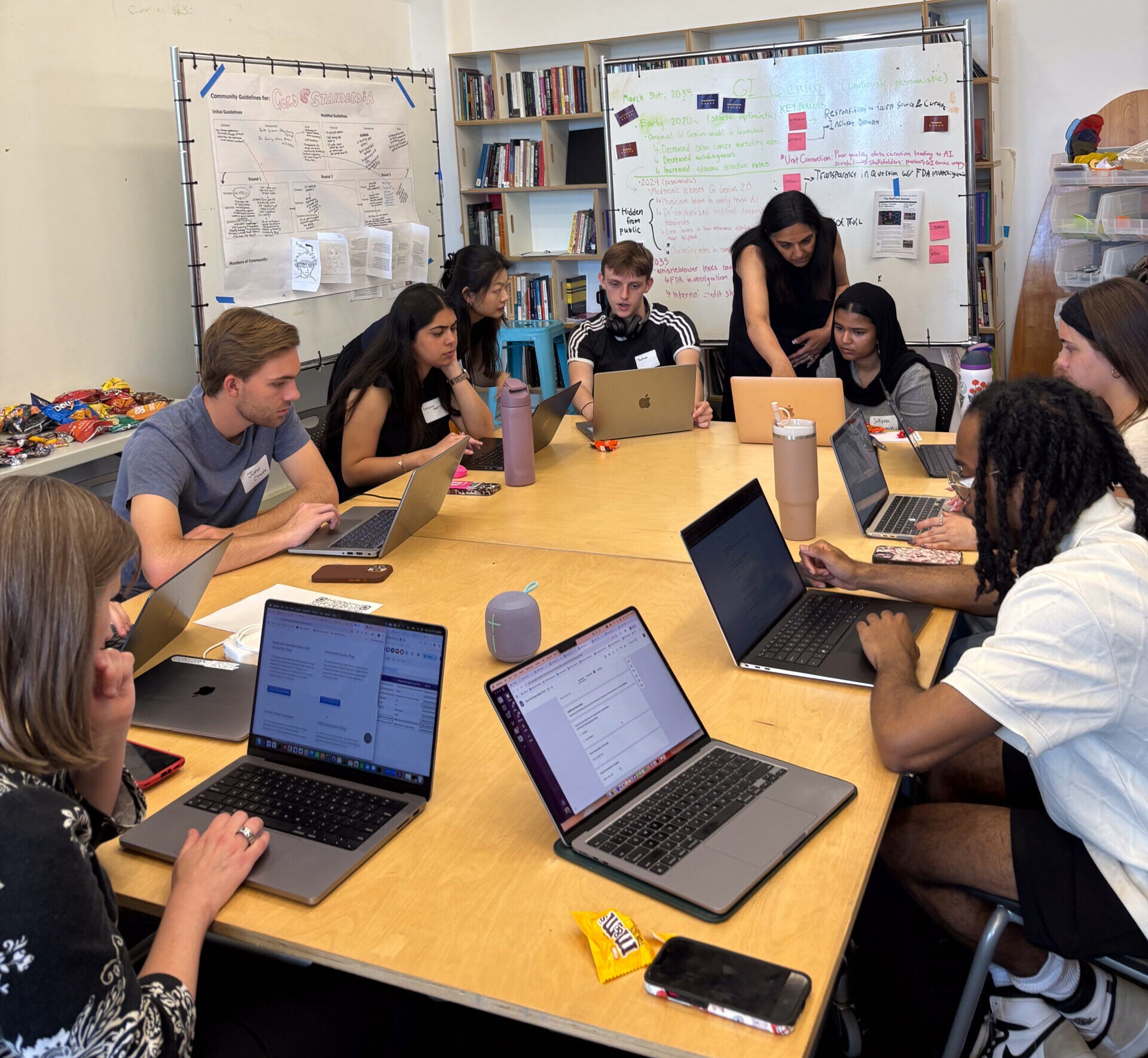
Students at Massive Data Institute working on data preservation efforts at MDI’s Save the Data event
Research Opportunities
At McCourt, there are plenty of opportunities to get involved in research.
All students (including international students) can apply to become Research Assistants (RAs) in late August. RAs support tenure-line McCourt School faculty in their research for approximately 10 hours per week and are paid hourly (current rate is $23/hr). Approximately 30 RAs are hired per year.
McCourt also has a number of affiliated centers that are engaged in research, professional training, and sharing of information. Research center faculty hire McCourt students for RA positions, hold events that are open to McCourt students, and teach in McCourt Programs. Our 16 research centers cover politics, technology, Congress, health policy, international development, and social policy.
One center to highlight is the Massive Data Institute (MDI) which harnesses modern data and computing power to produce cutting edge research and improve public policy decision making across multiple policy areas. McCourt students have the opportunity to apply for an MDI Scholar position as well.
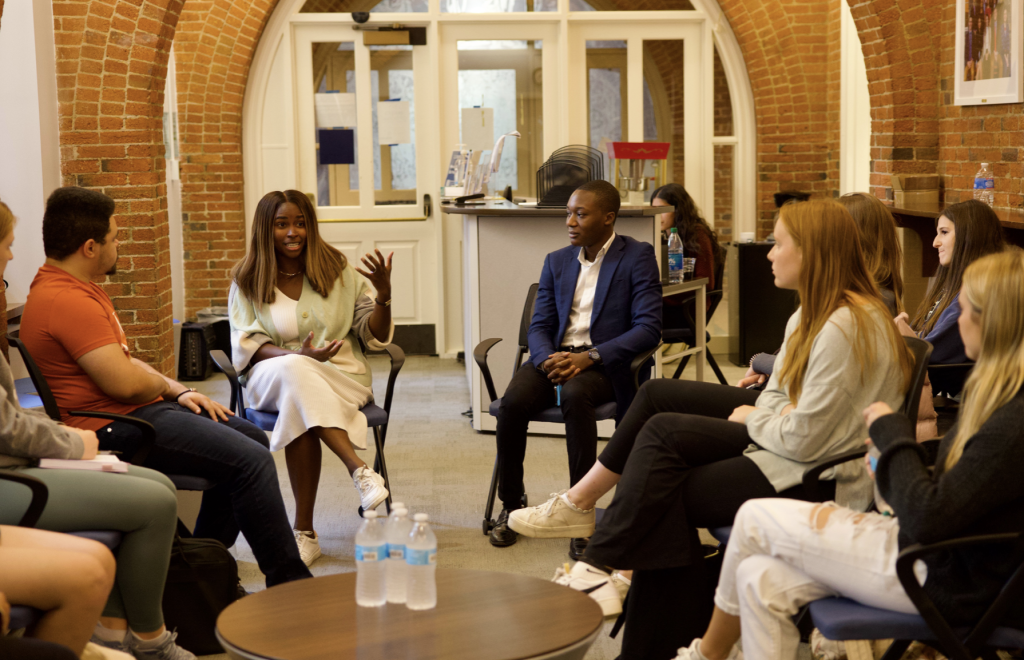
GU Politics Fellow leads discussion with students
GU Politics
The McCourt School launched the Georgetown Institute of Politics and Public Service with a simple mission – to help prepare more young people to go into public service.
GU Politics has worked to achieve this through four main goals:
1. Pulling back the curtain on the political process, primarily by giving students access to top practitioners
2. Helping students figure out their own path to careers in public service through mentorship and skills-building
3. Facilitating conversations between practitioners and students where they can share with each other ideas on how to improve the process
4. Fostering opportunities and skills to pop filter bubbles in order to promote better understanding and less toxicity in the political dialogue
Each semester, some of the biggest names in politics, journalism, and public service become GU Politics Fellows. The Fellows Program connects students with political leaders to learn from one another and tackle some of the biggest political challenges of the day.